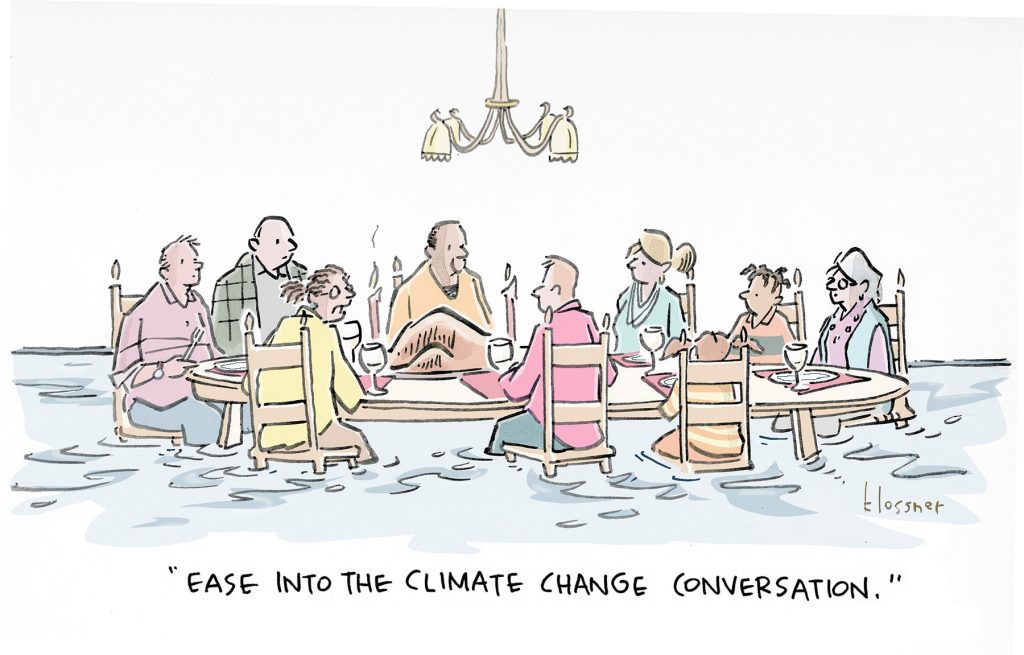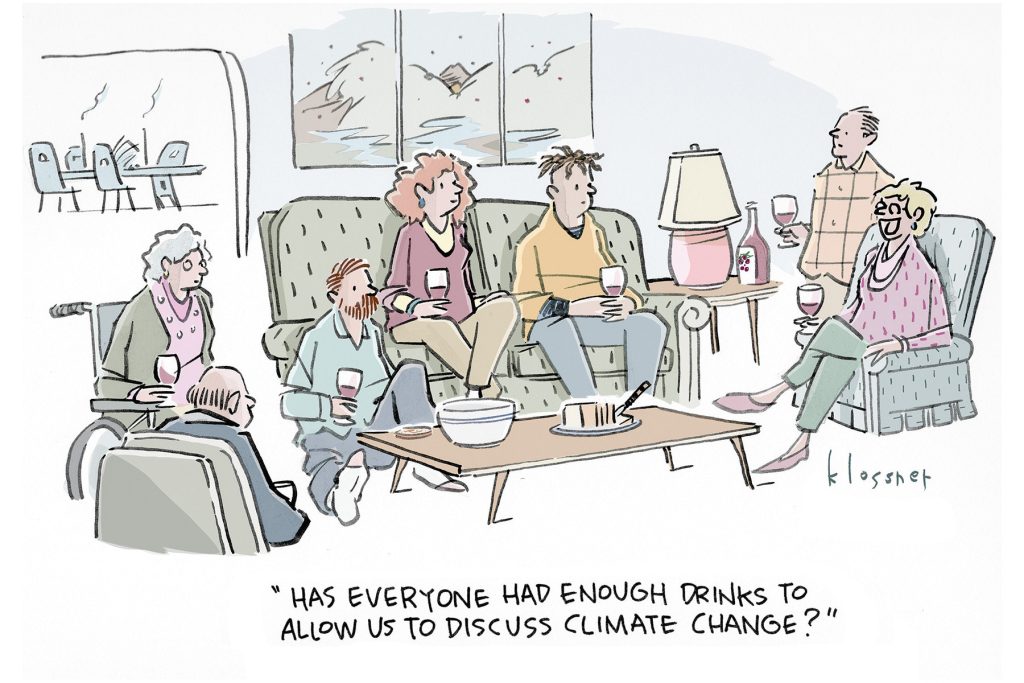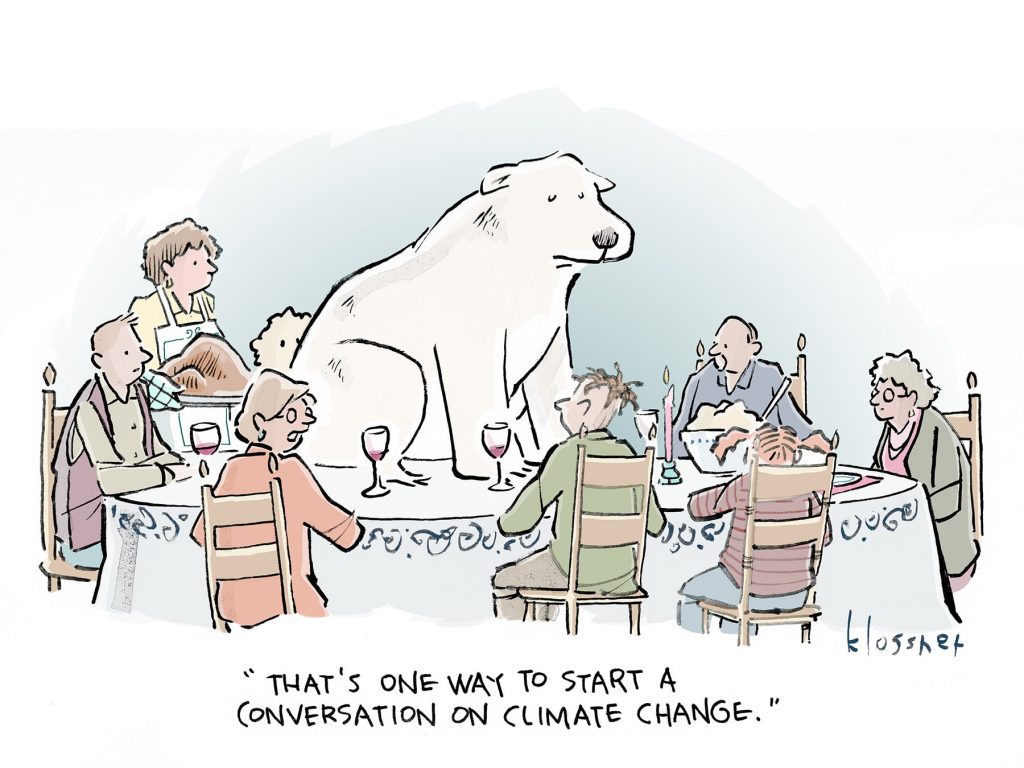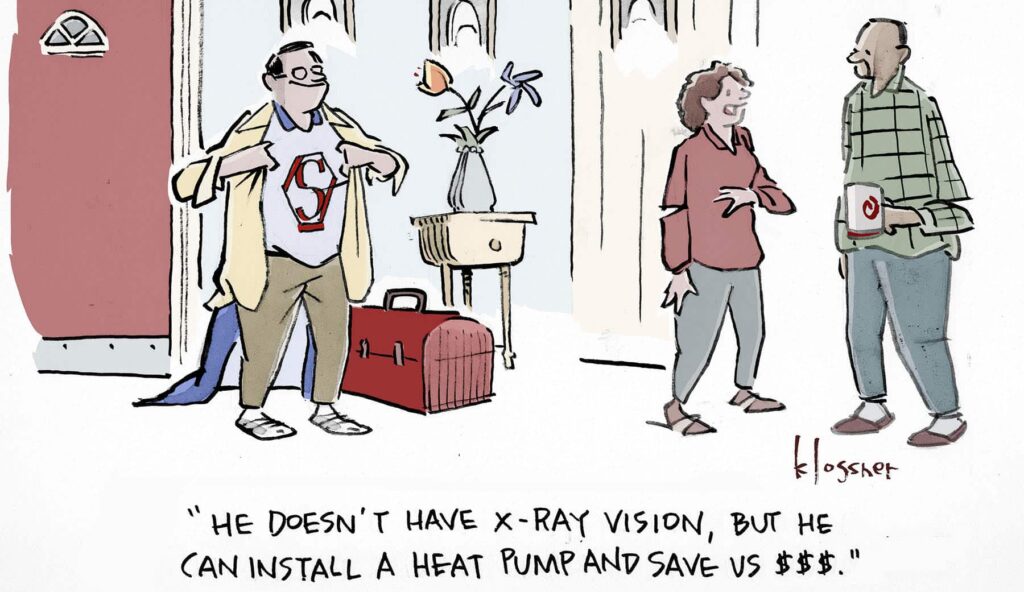Welcome to The Holiday Season! Your challenge, should you choose to accept it: Engage with that relative who loves to talk about how climate change is a hoax every time the mercury dips below 50 degrees.
We’re here with some tips. But first, a spoiler alert: No one has yet devised a proven rhetorical tool for boosting the relevance of scientific fact over emotions, conspiracies, and plain old inertia. If that were the case, we wouldn’t be in a climate crisis to begin with. Already, you know better than to hope your fossil-friendly uncle or cousin is going to walk away from a dinner chat thinking, “Hey, maybe I was wrong to talk trash about Greta Thunberg. Now what should I research first, an electric car or solar panels?”
Why bother then, you might ask? It can be frustrating to talk with someone who is denying or dismissing an issue so fundamental to our survival on this planet. And then there’s the concern that if you drop some facts, you might inadvertently cause your relative to double down on climate change denial—we’ll get to that one in a minute.

The debunking dance
A good goal for any conversation about climate change, aside from retaining your sanity, is simply to counter misinformation, and to do it without shaming people or arguing them down.
When you do this, you are achieving two things: You’re preventing that bad info from “sticking” with other people in the room (especially kids), and you’re actively refuting falsehoods where they have already taken hold. Both of these are strategies laid out in the helpful Debunking Handbook 2020, written by a team of 22 scholars and posted at the George Mason University Center for Climate Change Communication.
The debunking handbook, appropriately enough, debunks a common perception about debunking: The aforementioned notion that a person will hold tighter to false beliefs when presented with evidence to the contrary. This is called the backfire effect, and it seems especially relevant in a world where one can go to any number of websites that peddle fave denier ideas.
But recent research suggests the backfire effect, though it does happen, is not inevitable.
“Backfire effects occur only occasionally, and the risk of occurrence is lower in most situations than once thought,” say the Debunking Handbook authors. “Do not refrain from attempting to debunk or correct misinformation out of fear that doing so will backfire or increase beliefs in false information.”
The debunking handbook suggests a sort of fact-sandwich strategy that lends itself to a written debunk, say, on social media. You lead with a simple fact, nod to the myth, explain the problem with the myth, and close by restating facts.
For example: “Turns out the last seven years have been the warmest on record. So when the weather turns cold and you hear, ‘It’s 30 degrees out today, there is no such thing as global warming,’ know that that’s ignoring the wider trend. Yes, we still have cold days. Overall, though, the world is warmer than ever, and the hot days are getting hotter.”

Six ideas for talking about climate change
Okay, maybe that fact-sandwich approach gets you a few likes on Facebook. And maybe you’re the type who can coolly rattle off some climate facts over crudites like it’s nothing. For the rest of us, it’s useful to have some guidance for in-person encounters. To that end:
1. Have a conversation, not a debate. Climate scientist Astrid Caldas, who speaks to all kinds of audiences, says in a video about combating misinformation, “It’s never a lecture. It’s a conversation.” If you try to “win” with the most facts or get emotional to the point of having a heated argument, both sides lose.
2. Ask questions—and listen to the answers. One of the best ways to start a conversation, of course, is to ask a question. The organizational psychologist Adam Grant has suggested that motivational interviewing, a technique developed to treat addictions, can also get people to reconsider false notions. Even without trying to change someone’s mind, asking questions can give you a better sense of what their concerns are.
3. Find common ground. Caldas also recommends knowing your audience—that, along with asking questions, helps locate where you might agree. “Connecting with people is easier than people think,” she says. “There is always something that we have in common with somebody.” Maybe your dad thinks all this talk about ditching fossil fuels to save the planet is nonsense. But he might have an open ear to spending less on gasoline with a fuel-efficient car or lowering the monthly power bill by installing solar panels.
4. Talk about what they care about. Many studies on communication and behavior confirm the importance of appealing (or avoiding a challenge) to a person’s sense of identity. Research shows that people may respond best to peer pressure (do any of your dad’s buddies have EVs?) or messages that confirm their own world view. One study found Republicans were more likely to recycle in response to messaging about civic duty, as opposed to being green. When making your point, you don’t have to reference environmental groups and Democrats, which could undermine your message, depending on your audience. NASA has a ton of great facts on climate change. Or you can bring up how the military was still powering ahead with clean energy under Trump, because it’s strategically smart.
5. Focus on the positive. This goes back to the common ground idea. Rather than get bogged down in whether or not humans are causing climate change, can you agree that some aspects of the clean energy economy are really cool? There’s a reason Republican Texas is also the country’s top wind energy state. Human ingenuity has driven job-creating sources of homegrown, renewable energy. Heck, there are electric cars out that can go from 0 to 60 miles per hour in under 3 seconds. Who cares that they don’t burn gasoline?
6. Know when to let go. Remember not to be what Grant calls a “logic bully” who is out to convert or defeat opponents. If you’re talking (civilly) about climate change at all, that’s a win—as climate scientist Katharine Hayhoe has pointed out, conversations are “the only way revolutions ever started.” Not speaking out leads to a “spiral of silence,” the Debunking Handbook says, where a “mute majority cedes a narrative to a vocal but misinformed minority.”

Denial comes in many forms. The hallmarks: downplaying the urgency of the crisis, dragging feet on action, or watering down commitments. Your cranky aunt certainly isn’t the only one facing this crisis with folded arms.
But it’s also worth noting that the number of Americans who say they are alarmed about climate change has increased 50% over the past five years, while the “dismissive” camp is shrinking. And solutions are out there. You might not be able to change anyone’s mind over a single meal, but you can stand up for facts and hope.















